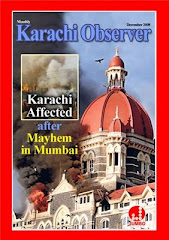By Talat MasoodThe way events are unfolding in Pakistan it appears our national failure has been programmed and the political software written by our leaders, whether it was the erstwhile military regime or the current civilian leadership, leaves little scope for recovery. In the face of multiple challenges that the country is confronted with, the need is to develop a broad consensus. Instead President Zardari regrettably is pursuing, the politics of “winner takes all” and Nawaz Sharif is taking his fight to the streets. When the country is facing an expanding insurgency in FATA and parts of NWFP, a nationalist uprising in Baluchistan, an economy in deep distress, increasing tensions with India and acute problems of governance it is mind boggling why any leader should try to destabilize Punjab.
The implications of the court decision are going to be far reaching on the body politic and economy of the country. First, in the short term it would deflect the attention of the government from combating insurgency and counter terrorism. For the government to place reliance on the recent peace deals in Swat and elsewhere would be premature and misleading, as the situation is still tenuous and uncertainClearly, PML-N is the most important political force in Punjab and the second largest national party and it is imprudent to antagonize them at this juncture, when owning the fight against insurgents and mobilizing public opinion against them is crucial. Moreover, PML-N has been taking a moderate and balanced approach toward fighting insurgency in FATA and advocating a firm policy of controlling militants that are destabilizing Pakistan and creating serious problems with India.
It is likely that political expediency may push PML-N in a close alliance with rightist and hard line parties and fight against militancy will weaken. The opposition cannot be expected to remain silent in the face of President Zardari’s effort to impose PPP rule throughout the country. What is more politically significant is that PML-N joining the lawyers’ movement will give a new momentum to it! And as other opposition elements join the band wagon it may result in building a critical mass sufficient to unhinge the government that already is so weak.
PPP regrettably, ever since the tragic death of Benazir Bhutto has been factionalized, its democratic character marred by the authoritarian style of its new leadership and is unlikely to provide the motivation to resist the emerging countervailing political forces. The opposition parties may also succeed in driving a wedge between Prime Minister Gilani and President Zardari. Their relationship is already under stress as most of the government powers rest with the prime minister but are being exercised by President Zardari.
Lack of credibility and popular perception about the legitimacy of the higher courts and of President Zardari, makes the court’s decision to disqualify the Sharif brothers and the imposition of governor’s rule difficult to stick. In any case disqualification of Sharif brothers has been a great setback to democracy and pluralism.
If confrontation is not avoided soon the economic problems will get compounded and political instability will increase. Domestic and external investments will further dry up and overall productivity will fall. Our dependence on IMF, international donor agencies and US assistance which is already high will increase. US influence which is pervasive could become overwhelming. Poverty levels will rise, causing hardship to large cross sections of people. It has been experienced that financially and bureaucratically weak governments create an environment that favours militant recruitment and poorer countries suffer longer insurgencies.
For democracy to endure in a poor country as ours, economic growth is essential. Economic development allows middle class to gain economic and political power as private business and civil society gains strength. All these possibilities would be lost if the political foes do not reconcile their differences.
India will take full advantage of Pakistan’s internal dissensions and will step up its diplomatic pressure.
Military leadership so far has been trying to stay away from politics, but may be constrained to intervene if conditions deteriorate to prevent country’s slide into chaos. And politicians have to remind themselves that every military intervention has been berthed in gratitude albeit the honeymoon has been short lived as they too have failed miserably in solving the country’s myriad problems.
The way to prevent the country from a downward spiral is for President Zardari and Nawaz Sharif to move from confrontation to reconciliation and develop a framework for coexistence and tolerance for each other. Punjab must return to PML-N, just as the PPP government at the centre should be allowed to complete its full term. Any unjust dispensation of political power will accelerate the downslide. We have the experience of 90’s in front of us and President Musharraf’s blunders fresh in our memory. His lack of understanding of the value of institutions be it judiciary, parliament, political parties or bureaucracy brought the country to the brink of a chasm.
Similarly, PPP and PML leaders in the 90’s tried to undermine each other and weakened democratic institutions. It seems they have not learnt from their past mistakes despite the assurances they were giving to the electorate before the elections. It is time that the political leaders diverted their energies toward building the country and wrapping up their convoluted ambitions. They have to draw strength from the people and be accountable to them if they have to stay in power and ensure an enduring democracy.
The writer is a retired lieutenant-general. Email:
talat@comsats.net.pk 


























